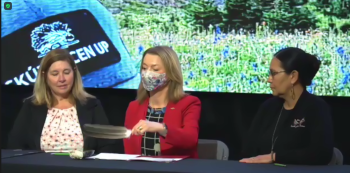Image Caption
Summary
Local Journalism Initiative Reporter
Windspeaker.com
It was a difficult road to travel but signatories to the first co-created child and family welfare agreement between a First Nation and the British Columbia government say an important precedent has been set.
On April 12, Simpcw First Nation Kukpi7 Shelly Loring and the rest of council made the Tcwesétmentem agreement (which in Secwepemctsín means “walking together”) official with BC Children and Family Development Minister Mitzi Dean. The ceremony saw the collaborative approach illustrated by the signing of paper and the smudging of elected officials.
“I’m really, really happy that we’ve finally arrived at this day. It represents a culmination of more than two years of development and negotiations with the Ministry of Children and Family Development—MCFD,” said Loring.
“This agreement that is legally binding creates a new relationship and significantly changes child welfare practises and ensures our Nation’s support for the wellbeing of our members across British Columbia, our members being … our children, our families, and more so for some of us our grandchildren. Simpcw is setting the course for many other Nations and for many other discussions.”
The agreement will inform child welfare decision-making and ensure the Simpcw First Nation is involved in the protection, planning and placement of their children and youth who come into contact with the child welfare system. It recognizes elements of the federal Act respecting First Nations, Inuit and Métis children, youth and families, which came into force in 2020.
Tcwesétmentem may only be an interim measure for Simpcw to exercise their jurisdiction, but it’s an important step, said Loring.
“It’s my hope that achieving this significant milestone on our pathway to jurisdiction will inspire confidence in our members that we are on the right path and we will get it done,” she said.
One unique and important aspect of the agreement, Loring pointed out, is that it includes Secwepemctsín, the traditional language of the Simpcw people.
Simpcw began working on the agreement shortly after amendments to BC’s Child, Family and Community Services Act came into force in April 2019. The act enabled the government and Indigenous communities to enter into agreements to support greater collaboration in planning and carrying out services for children, youth and families.
In June 2020, the first version of Simpcw’s proposed agreement went to the ministry and negotiations got underway. Barely six months later, negotiations stalled.
“Back in December 2020, I wasn’t too sure we would get to this day. It was quite the battle and quite the challenges that have come up throughout the negotiations of this agreement. We ended up starting over about that time,” said Simpcw Councillor Alison Green, who along with Councillor George Lampreau represented the council in negotiations.
“We, in turn, became very grateful because it made a more fulsome discussion. The discussions that we’ve had over the past year and a bit have really changed the agreement.”
Green said the agreement was only for BC at this point, but will eventually cover Simpcw children throughout Canada.
“I’m looking forward to the day when we’re able to have jurisdiction. This is just an interim measure, but it has changed history, it has changed practise and it’s … definitely going to help our families throughout BC in changing the way they see MCFD as well,” said Green.
Carmen Hance and Allen Cummings led the negotiations for Simpcw First Nation.
“The history of child welfare is a dark history for Indigenous people and it’s a history that we don’t want to go back to,” said Hance. “This agreement signifies a new path for Indigenous people, especially the Simpcw people, in making sure that our families are no longer harmed by a system that’s created to separate families. It’s a mechanism for us to then advocate fully to our ability to make sure that that doesn’t happen again and to ensure our families are getting to the best possible service from MCFD delegate agencies and from us.”
Mitzi Dean, child and family development minister, acknowledged the harm the colonial approach to child welfare had done to First Nations children and their families, as well as the struggles in negotiating the Simpcw agreement.
She called Tcwesétmentem a “guiding light” for other Indigenous communities.
“It sets the stage for the next steps, and of course that is moving towards inherent jurisdiction. This is a really important milestone on that journey. We want to work with you to be able to take those next steps, walk together and help to achieve jurisdiction as well. That is a priority for us as a ministry,” said Dean.
Loring said that next will be training for both MCFD and Simpwc people to understand and implement the changes in delivering child, youth and family services.
Loring added that Tcwesétmentem was a living document that would be reviewed annually or “as needed and revisions will be made.”
Local Journalism Initiative Reporters are supported by a financial contribution made by the Government of Canada.

